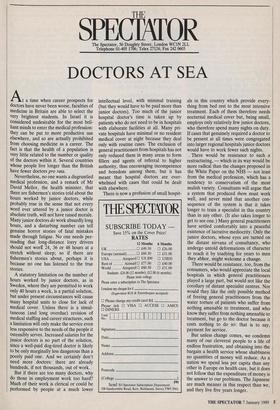rIHE
SPECTATOR
The Spectator, 56 Doughty Street, London WC1N 2LL Telephone 01-405 1706; Telex 27124; Fax 242 0603
DOCTORS AT SEA
At a time when career prospects for doctors have never been worse, faculties of medicine in Britain are able to select the very brightest students. In Israel it is considered undesirable for the most bril- liant minds to enter the medical profession: they can be put to more productive use elsewhere, and so are actually prohibited from choosing medicine as a career. The fact is that the health of a population is very little related to the number or quality of the doctors within it. Several countries whose people live longer than the British have fewer doctors pro rata.
Nevertheless, no one wants a disgruntled medical profession, and a remark of Mr David Mellor, the health minister, that there are fishermen's stories told about the hours worked by junior doctors, while probably true in the sense that not every word ever uttered by a junior doctor is absolute truth, will not have raised morale. Many junior doctors do work absurdly long hours, and a disturbing number can tell genuine horror stories of fatal mistakes made through fatigue. No one needs per- suading that long-distance lorry drivers should not work 24, 36 or 48 hours at a stretch without sleep; so if there are fishermen's stories about, perhaps it is because no one has listened to the true stories.
A statutory limitation on the number of hours worked by junior doctors, as in Sweden, where they are permitted to work only 40 hours a week, is a partial solution, but under present circumstances will cause many hospital units to close for lack of medical cover. Unless there is a simul- taneous (and long overdue) revision of medical staffing and career structures, such a limitation will only make the service even less responsive to the needs of the people it ostensibly serves. Increased salaries for the junior doctors is no part of the solution, since a well-paid dog-tired doctor is likely to be only marginally less dangerous than a poorly paid one. And we certainly don't need more doctors: there are already hundreds, if not thousands, out of work.
But if there are too many doctors, why do those in employment work too hard? Much of their work is clerical or could be performed by people at a much lower intellectual level, with minimal training (but they would have to be paid more than junior doctors). Too much of the junior hospital doctor's time is taken up by patients who do not need to be in hospitals with elaborate facilities at all. Many pri- vate hospitals have minimal or no resident medical cover at night because they deal only with routine cases. The exclusion of general practitioners from hospitals has not only reduced them in many areas to form fillers and agents of referral to higher authority, thus encouraging incompetence and boredom among them, but it has meant that hospital doctors are over- whelmed with cases that could be dealt with elsewhere.
There is now a profusion of small hospit- als in this country which provide every- thing from bed rest to the most intensive treatment. Each of them therefore needs nocturnal medical cover but, being small, employs only relatively few junior doctors, who therefore spend many nights on duty. If cases that genuinely required a doctor to be present at all times were congregated into larger regional hospitals junior doctors would have to work fewer such nights.
_ There would be resistance to such a restructuring, — which in its way would be more radical than the changes proposed in the White Paper on the NHS — not least from the medical profession, which has a tendency to conservatism of the most mulish variety. Consultants will argue that a system that produced them must work well, and never mind that another con- sequence of the system is that it takes longer to train a specialist in this country than in any other. (It also takes longer to get to see one.) Many general practitioners have settled comfortably into a peaceful existence of lucrative mediocrity. Only the junior doctors, whose eyes are turned on the distant nirvana of consultancy, who undergo untold deformations of character to reach it by toadying for years to men they abhor, might welcome a change.
There would be resistance, too, from the consumers, who would appreciate the local hospitals in which general practitioners played a large part, but would not like the corollary of distant specialist centres. Nor would they like the only possible method of freeing general practitioners from the water torture of patients who suffer from nothing amenable to treatment, and who know they suffer from nothing amenable to treatment, but go to the doctor because it costs nothing to do so: that is to say, payment for service.
But unless change comes, we condemn many of our cleverest people to a life of endless frustration, and obtaining into the bargain a health service whose shabbiness no quantities of money will reduce. As a nation we spend less per capita than any other in Europe on health care, but it does not follow that the expenditure of money is the answer to our problems. The Japanese are much meaner in this respect than we, and they live five years longer.










































 Previous page
Previous page